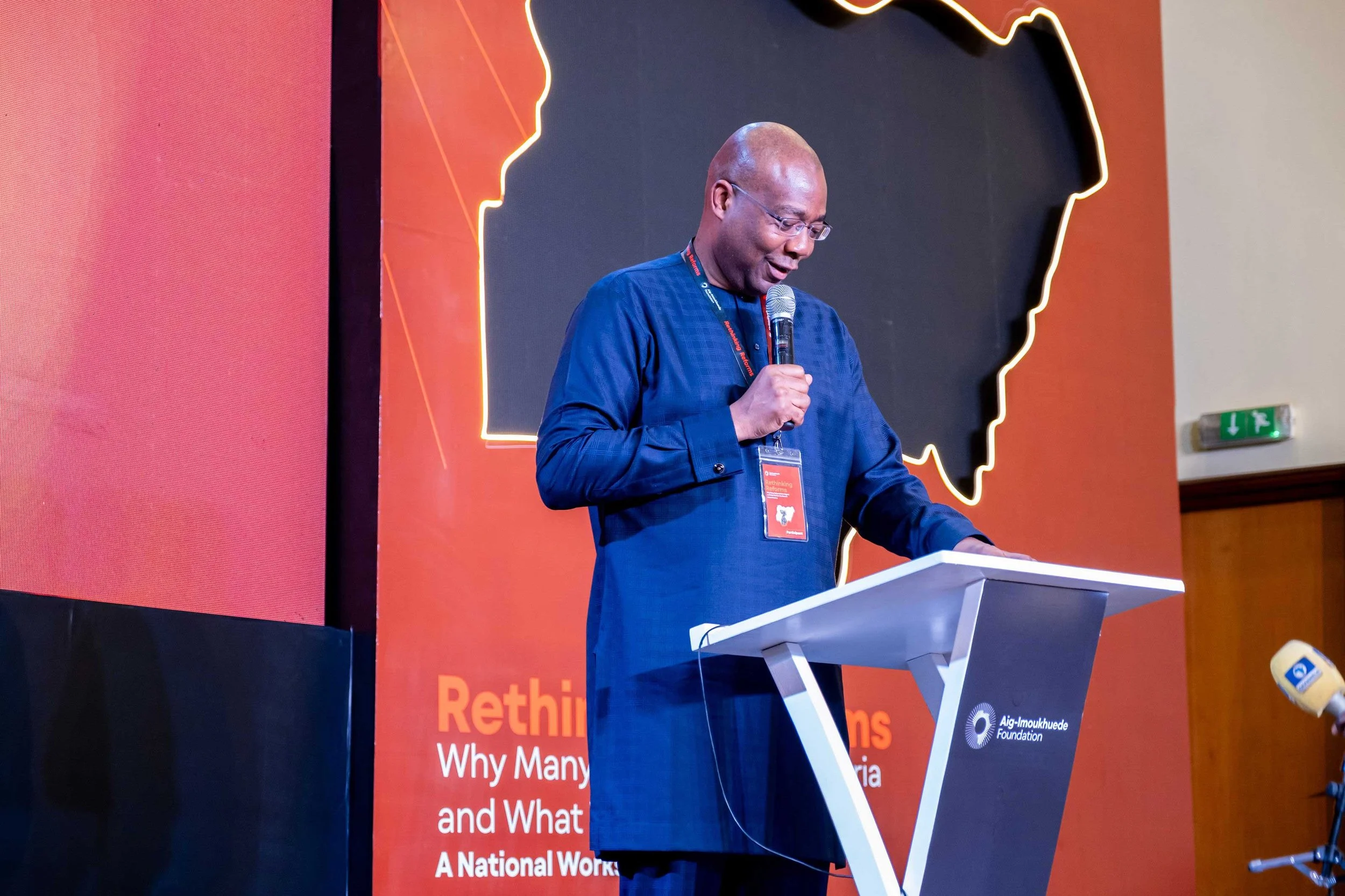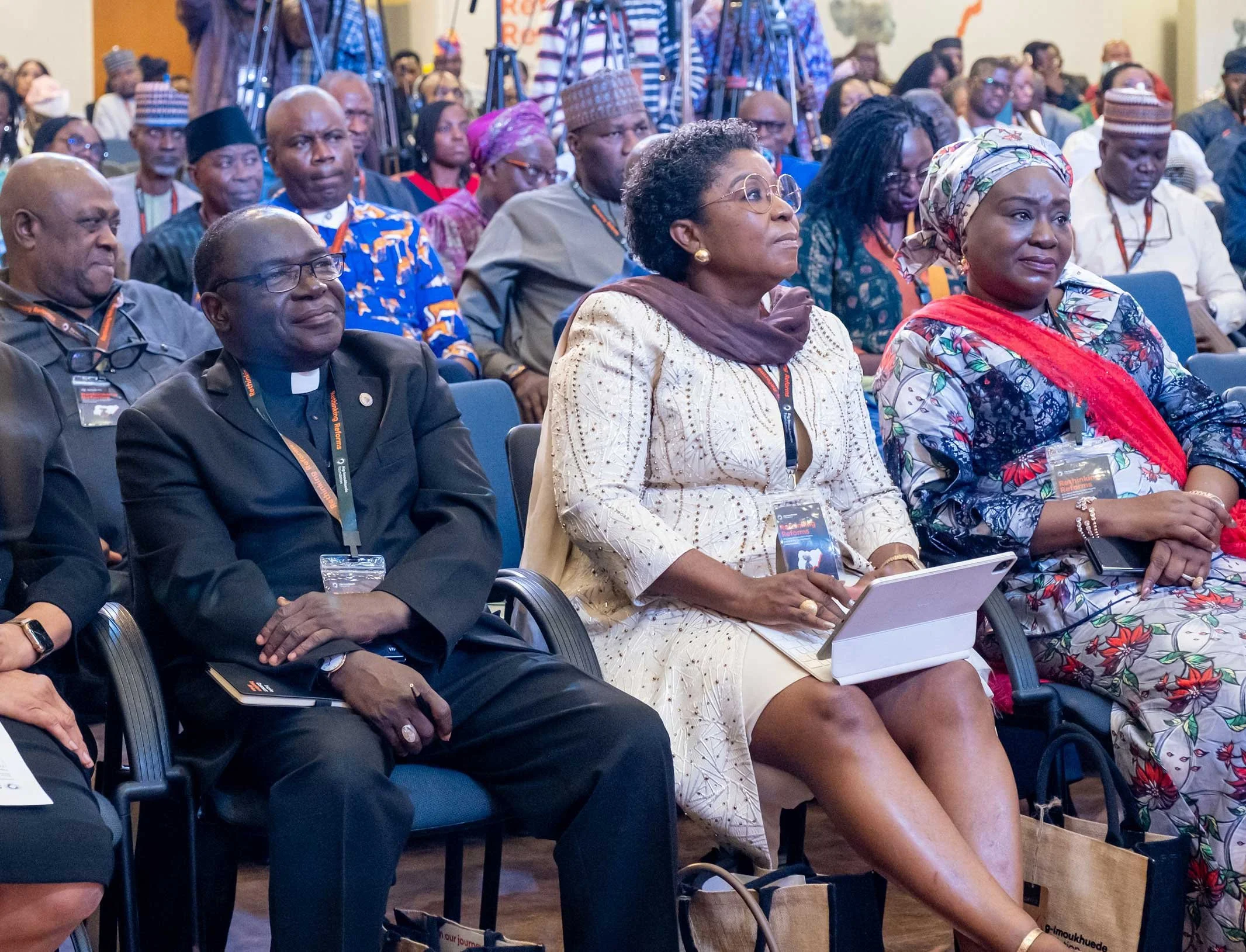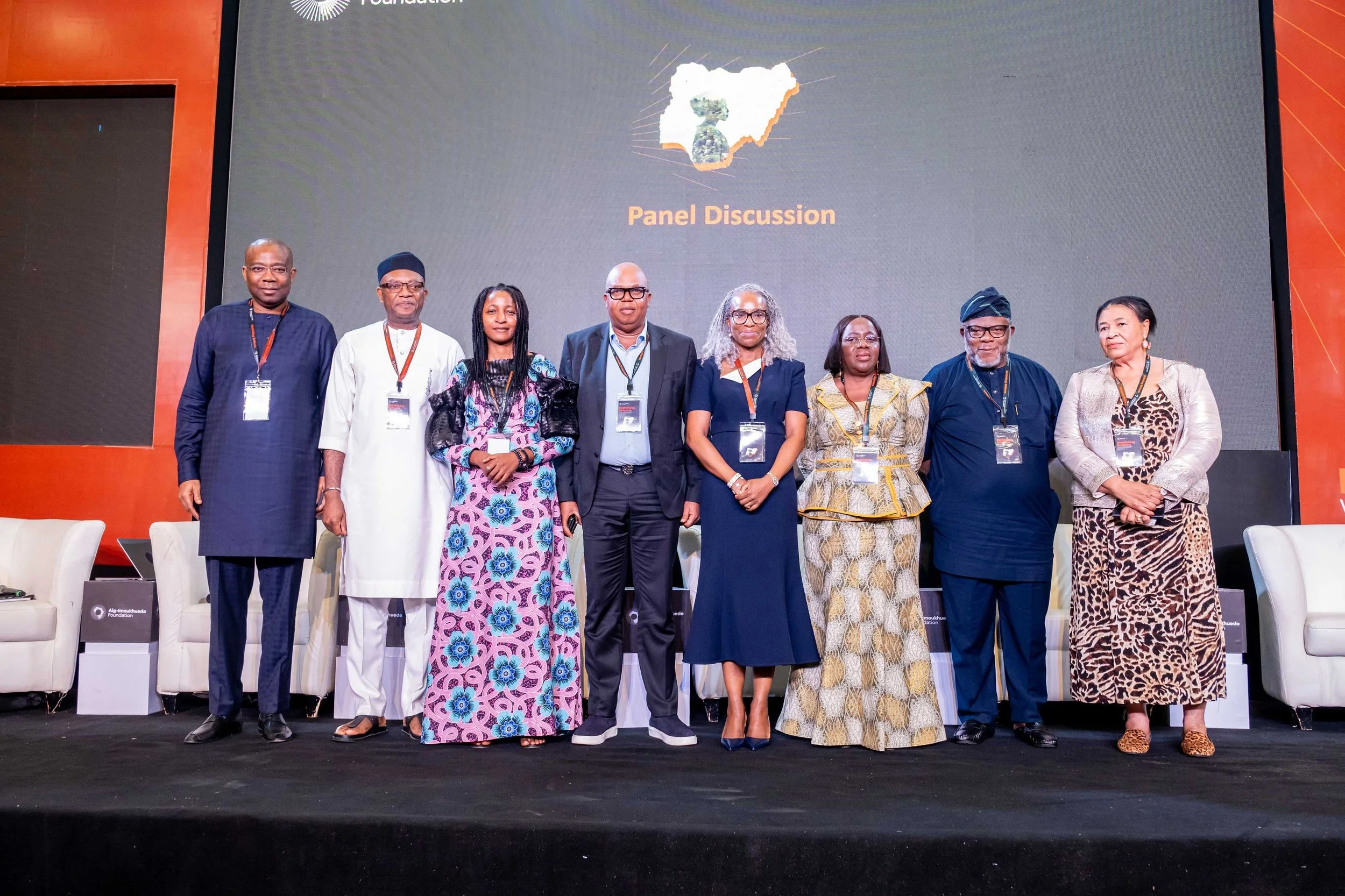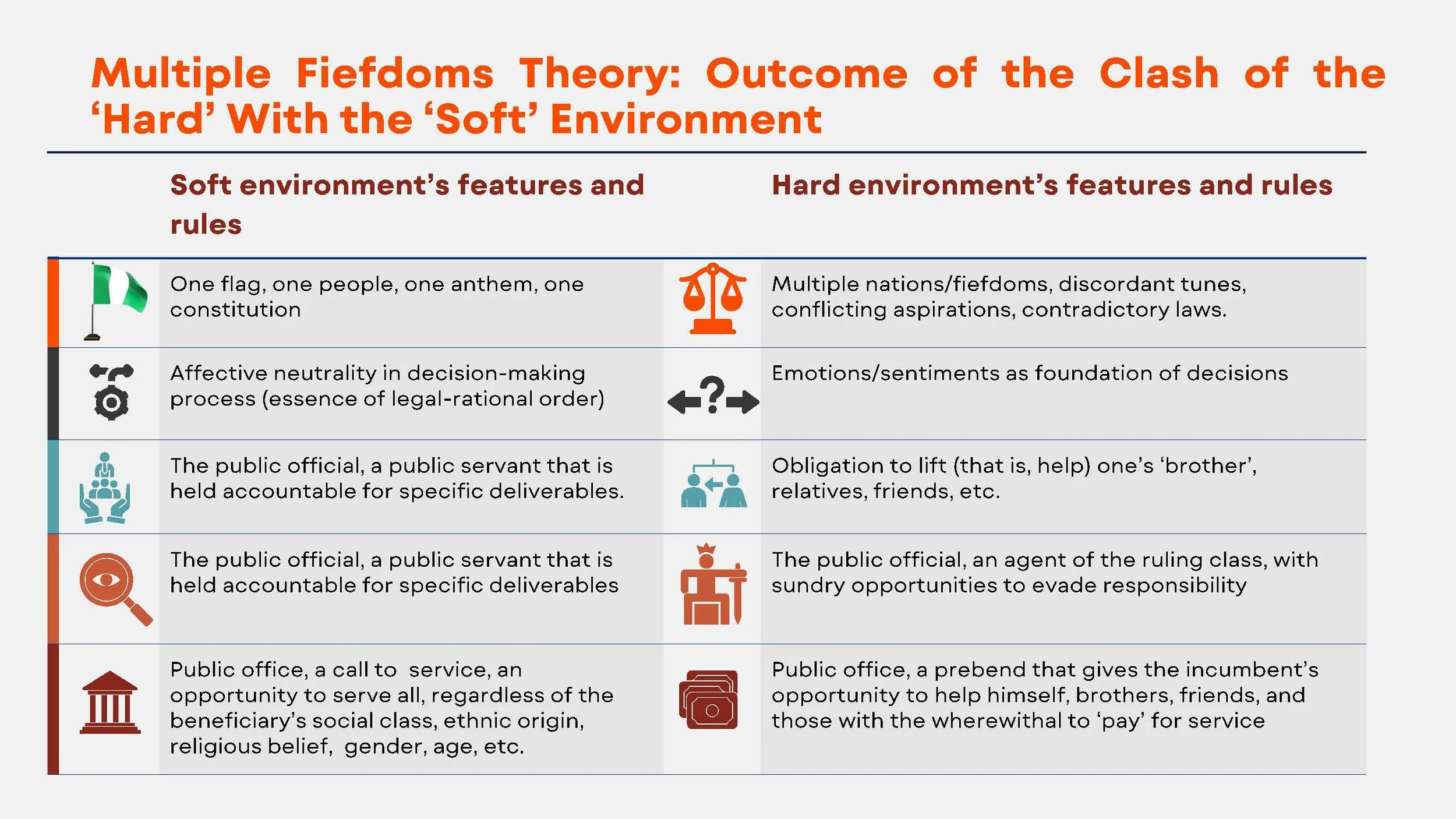Rethinking Reforms: A Deep Dive into Nigeria's Public Sector Challenges
Author and Contributing author:
Ofovwe Aig-Imoukhuede, Boluwatife Adetokunbo
The Aig-Imoukhuede Foundation’s National Workshop on "Rethinking Reforms: Why Many Reforms Fail in Nigeria and What We Can Do About It" offered a valuable platform for discussing the challenges hindering Nigeria's public sector reform efforts and exploring potential solutions. It marked a significant step forward in the Foundation’s efforts to improving public service delivery in Nigeria.
The workshop brought together a distinguished assembly of experts, policymakers, and stakeholders to dissect the complex challenges impeding the nation's progress, including panellists Dr. ‘Dere Awosika OON MFR, Dr. Magdalene Ajani, Dr. Joe Abah, Mr. Uyi Akpata, and Mr. ‘Laoye Jaiyeola, who all shared invaluable insights on the complexities of public sector reform and what can be done to ensure its success. The workshop also welcomed the presence of the following contributors: former President Chief Olusegun Obasanjo GCFR, Justice Amina Augie CON, Dr. Oby Ezekwesili, Bishop Matthew Kukah and Mr. Bismarck Rewane. The event was further elevated by the presence of the outgoing Head of Service, Dr. Folasade Yemi-Esan, CFR, who delivered a keynote address, highlighting the laudable reform efforts that were ongoing in the Civil Service. Also present was her incoming successor, Mrs. Didi Walson-Jack mmi, signaling succession planning and policy continuity, as well as Permanent Secretaries and Directors from across the Service, whose presence underscored their interest in pushing the Service forward.
The workshop also witnessed the attendance of key government Ministers including Senator Abubakar Bagudu, Minister of Budget and Economic Planning; Mr Wale Edun, Minister of Finance and Coordinating Minister of the Economy; Dr. ‘Bosun Tijani, Minister of Communications, Innovations, and Digital Economy and Mrs Hannatu Musa-Musawa, Minister of Arts, Culture, and the Creative Economy.
Central to the workshop's discussions was the groundbreaking research presented by Professor Murtala Balogun, which introduced the "Multiple Fiefdoms Theory." This theory posits a stark contrast between the "Soft Environment," characterized by unity, accountability, and a focus on public service, and the "Hard Environment," marked by divisions, personal interests, and a culture of patronage. As Professor Balogun aptly stated, "Rational thinking is crucial for reforms to be impactful. Nigerians need to consider the effects of their actions as a people."
The Need for a Paradigm Shift
The ‘Soft Environment’, as envisioned by Professor Balogun, is one where public official are primarily motivated by a desire to serve the nation and are held accountable for their actions. It is a space characterized by shared values, a strong sense of national identity, and a commitment to the rule of law. Conversely, the Hard Environment is marked by divisions along ethnic, religious, and regional lines. Personal interests and loyalties often take precedence over public service. This environment is characterized by a lack of trust, corruption, and inefficiency.
This duality, as Professor Balogun emphasized, creates a complex and often contradictory landscape for policymakers. The heterogeneity of the hard environment leads to role ambiguity, hindering efficient public service operations and undermining reform efforts.
The Role of Leadership and Governance
Former President of the Federal Republic of Nigeria, Chief Olusegun Obasanjo GCFR, emphasised the significance of continuity in the reform process, stating that "The greatest bane of reforms is discontinuity of the key actors. Any break in continuity means virtually the end of reform." He also outlined the essential personnel required to ensure successful reform – the initiator, driver, owner, executor, and sustainer – and stressed the pivotal role of competence, collaboration between Ministers and other political leaders and the Public Service technocrats (Permanent Secretaries), adequate remuneration, and effective communication, in delivering effective public service.
This point was echoed by other speakers, who emphasised the need for sustained commitment and leadership. Dr. Magdalene Ajani, Permanent Secretary, Ministry of Interior, emphasized the importance of a “whole-of-government” approach, stating, "We must first, learn to trust ourselves, we should look at collaboration, rather than competition."
Justice Amina Augie, CON, highlighted the importance of accountability and a paradigm shift within the judiciary. She emphasised the need for specialized judicial schools to cultivate a new generation of legal professionals. "We need people who know early that they are going into the judicial sector," she stated.
Bishop Matthew Kukah offered a broader perspective on the challenges facing Nigeria. He said, "Corruption is a symptom, not a disease," emphasizing the need to address underlying issues of national identity and unity. He further stated, "We are dealing with a slow decomposition of our nation in the hands of people who have come from the middle of nowhere."
The Role of the Private Sector
Mr. Laoye Jaiyeola and Mr. Uyi Akpata reiterated the crucial role of the private sector in driving public sector reform. Mr. Akpata highlighted the importance of understanding the reform process, particularly as it relates to human resource management. Dr. Magdalene Ajani also spoke to the need for collaboration between the public and private sectors, stating, "If the private sector understands that the impact of the services from the public sector affects their ROI, then they should come in and assist the public sector to deliver on their regulatory rules and policy development."
Key Challenges and Opportunities in Nigeria's Public Sector Reform
Key Challenges
The National Workshop highlighted several critical challenges impeding Nigeria's public sector reform efforts.
Lack of Continuity in Leadership
As former President Olusegun Obasanjo aptly stated, "The greatest bane of reforms is the discontinuity of personnel." The frequent changes in leadership have hampered the implementation of long-term reform agendas. Without consistent leadership and institutional memory, reforms often stall or are reversed entirely.
Weak Institutions
The absence of strong and independent institutions has contributed to a culture of impunity and inefficiency. As Dr. Joe Abah noted, "We need a sense of movement. We need to have a feel that something is happening." Without robust institutions to enforce laws, regulations, and accountability, reforms are difficult to implement and sustain.
Corruption and Lack of Accountability
Corruption remains a pervasive problem, undermining public trust and eroding resources. Justice Amina Augie emphasized the need for a culture of accountability within the civil service, stating, "People don’t like to report the other person in the civil service." Overcoming corruption requires a systemic approach that includes strengthening anti-corruption agencies, promoting transparency, and fostering a culture of integrity.
The "Multiple Fiefdoms" Challenge
Professor Murtala Balogun's "Multiple Fiefdoms Theory" provided a framework for understanding the complex interplay between competing interests within the Nigerian state. The coexistence of the "Soft" and "Hard" environments creates a challenging landscape for reform. As Professor Balogun emphasised, "Rational thinking is crucial for reforms to be impactful. Nigerians need to consider the effects of their actions as a people."
Opportunities for Improvement
Despite the challenges, the workshop also identified several opportunities for advancing public sector reform in Nigeria:
Strengthening Accountability Mechanisms
Implementing robust systems of checks and balances is essential for reducing corruption and improving governance. As Justice Amina Augie noted, "We need to have specialized schools, judicial colleges." Investing in the judiciary and law enforcement can enhance accountability and deter wrongdoing.
Investing in Human Capital Development
Building the capacity of public servants is crucial for effective service delivery. Dr. Magdalene Ajani emphasized the importance of a merit-based civil service. By investing in training, development, and capacity building, the government can create a more competent and responsive public service.
Promoting Citizen Participation
Engaging citizens in the reform process is essential for fostering ownership and accountability. By involving citizens in decision-making and providing opportunities for feedback, the government can increase public trust and support for reforms.
Strengthening Public-Private Partnerships
Collaboration between the public and private sectors can leverage resources and expertise for mutual benefit. As Mr. Uyi Akpata noted, the private sector can play a vital role in driving public sector reform.
By addressing these challenges and capitalizing on these opportunities, Nigeria can make significant progress in building a more effective and accountable public service.
Key Takeaways from the National Workshop
The National Workshop on "Rethinking Reforms: Why Many Reforms Fail in Nigeria and What We Can Do About It" yielded several critical insights into the challenges and opportunities for public sector reform in Nigeria.
The Importance of Continuity: Former President Olusegun Obasanjo’s emphasis on the detrimental effects of leadership discontinuity underscored the need for sustained reform efforts. As he stated, "The greatest bane of reforms is the discontinuity of personnel."
The Need for a Holistic Approach: The workshop highlighted the interconnectedness of various factors influencing public sector performance. Dr. Magdalene Ajani emphasized the importance of a "whole government approach," involving collaboration between the public and private sectors.
The Role of Accountability: Justice Amina Augie's call for a culture of accountability within the civil service resonated with participants. She emphasized the need to report wrongdoing and to prioritize merit over patronage.
The Impact of the Hard Environment: Professor Murtala Balogun's "Multiple Fiefdoms Theory" provided a framework for understanding the challenges posed by the Hard Environment. Overcoming this environment is crucial for successful reforms.
The Role of the Private Sector: The workshop underscored the importance of public-private partnerships in driving public sector reform. Mr. Laoye Jaiyeola and Mr. Uyi Akpata emphasized the need for greater collaboration between the two sectors.
The Need for a Shared National Vision: Bishop Matthew Kukah's call for a stronger sense of national identity resonated with participants. He emphasized the importance of collective pride and purpose in driving reform efforts.
A Call to Action
The workshop concluded with a strong call to action. The workshop fostered a shared understanding of the systemic challenges bedeviling Nigeria's public sector. Participants unanimously identified a confluence of issues, including the lack of a consensus on the national goal of development, the poor quality of our politics, and weak consequence management, as the primary obstacles to progress.
To surmount these hurdles, participants concurred on the necessity of a multi-pronged strategy encompassing the strengthening of accountability mechanisms through the use of technology, robust investments in human capital development, enhanced citizen participation to build public trust, and improved collaboration. On the quality of public servants, “We need the men and women in the public sector to be as good as those in the private sector.” asserted former President Obasanjo.
In the same vein, Dr Ajani, while calling for more support and collaboration especially from elected and appointed public servants, highlighted key reform initiatives being undertaken in the Civil Service.
Bishop Kukah's wise counsel, "One of the instruments of change is patience," resonated with participants as Nigerians grapple with the complexities of the reform process. Recognising that sustainable change requires time and perseverance, the workshop underscored the importance of sustained commitment and a long-term perspective.
Aigboje Aig-Imoukhuede, Chairman of the Aig-Imoukhuede Foundation, emphasized the importance of collective effort, stating, "It is not their Public Service, it is your Public Service, it is our Public Service and understand that as it strengthens, you strengthen as well. So, we must join hands together and make it work.”
“This workshop marks a pivotal moment as we begin Nigeria’s public sector reform journey. By working together, we can create a public sector that truly serves the needs and the aspirations of the Nigerian citizens, because those are who we truly serve.” declared Ofovwe Aig-Imoukhuede, Executive Vice Chair of the Aig-Imoukhuede Foundation.
The Foundation extends its gratitude to all participants, speakers, and partners for their invaluable contributions. As Dr. Ezekwesili poignantly stated, "The power to do reforms resides among us; we just need to find like minds to execute."
The Aig-Imoukhuede Foundation is committed to translating these insights into tangible actions. A comprehensive report capturing the workshop's proceedings, research findings, and recommendations will be unveiled in the coming weeks on our website.









